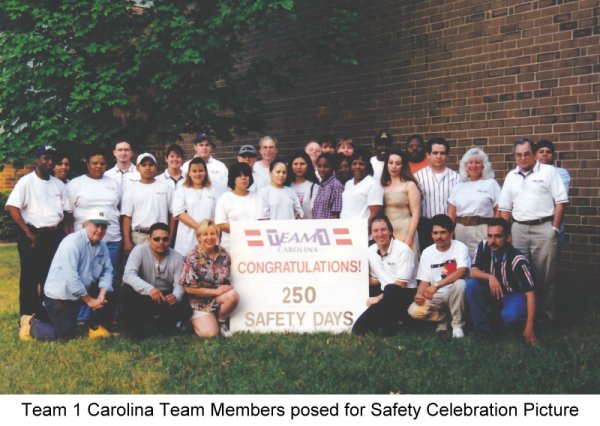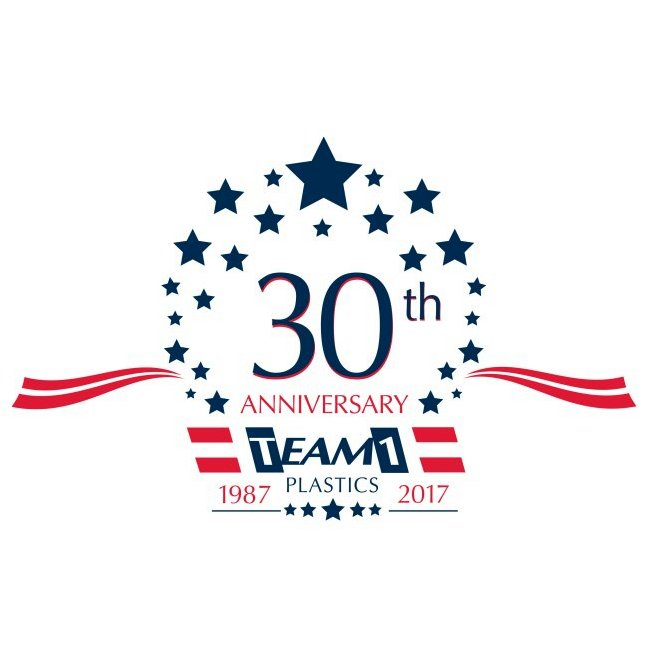A Look Back at the History of Team 1 Plastics
As part of the year-long celebration of its 30th anniversary, Team 1 Plastics, a plastic injection molding company for the transportation industry, is highlighting different milestones in its history through a series of articles. This month’s article features the story of Team 1 Carolina, described by Craig Carrel, President and Co-owner of Team 1 Plastics, as a “lost decade.”
In the early-1990s, as part of its search for plastics parts suppliers who could do insert molding, ASMO North Carolina visited and evaluated many potential suppliers, including Team 1 Plastics.
After the visit with ASMO North Carolina, the ownership of Team 1 Plastics decided that the company wasn’t interested in pursuing this new work. Carrel said, “We told them we weren’t really interested because we were so busy with our current customers. We just felt that we weren’t prepared to go there.” Team 1’s owners thought the matter was closed.
However, about a year later, Team 1 was approached by ASMO North Carolina again and asked to reconsider. Carrel said that ASMO told them that Team 1 was the only company that had declined to pursue work with them and that ASMO was impressed with Team 1’s reasons for declining the work. Carrel said that Team 1’s focus on servicing its existing customers instead of jumping at new business made ASMO want to partner with Team 1.
Team 1 Plastics did reconsider. At that point, the company was in a better situation to take on additional work so Team 1’s owners began discussions with ASMO North Carolina. Carrel said, “We began a more serious dialogue and began to understand their needs. ASMO committed to providing a certain amount of business over a specified amount of time. And, we committed to supporting them.”
As part of this commitment, Team 1 Plastics promised to open a plant near ASMO North Carolina within a short amount of time but start production in Albion. The company wanted to first establish its ability to produce and deliver quality parts. Rather than trying to make room for the ASMO work in its already very busy plant, Team 1 leased another building in Albion to set up a temporary plant for the work with ASMO.
“We bought one vertical machine,” Carrel said, “and started running it to do some sampling and some limited production. The agreement was that we would get it started here where we had the most resources. Once we had it up and running, then we would look at transferring it.” The distance between Michigan and North Carolina presented some challenges; and after about a year, the decision was made that it was time to move the work to North Carolina.
Jim Capo, then co-owner of Team 1 Plastics, volunteered to move his family to North Carolina and to run this new facility. Capo said that he loves “… the creative processes and to keep moving and trying new things. We had an opportunity to have a second plant. I jumped on that opportunity to go down to North Carolina.”
 A building in the Industrial Park of Greensboro, North Carolina, was obtained, and the vertical press that Team 1 had purchased for the ASMO work was shipped south. Another press was purchased, and Team 1 Carolina began production of insert molding components for ASMO North Carolina in May 1998.
A building in the Industrial Park of Greensboro, North Carolina, was obtained, and the vertical press that Team 1 had purchased for the ASMO work was shipped south. Another press was purchased, and Team 1 Carolina began production of insert molding components for ASMO North Carolina in May 1998.
Carrel said that the North Carolina plant was like a mirror of Team 1 Michigan – the new name for the plant in Albion. “We copied a lot of things from here. For instance, as soon as we could, we started running 24/7.” And Team 1 Carolina grew quickly. “At one time,” Carrel said, “it was even bigger than here in Michigan.”
About a year after establishing Team 1 Carolina, ASMO approached Team 1 Plastics with another opportunity. They wanted to add more minority-owned manufacturers to their supplier list. ASMO thought that Emergent Technologies, one of their suppliers, was a company that Team 1 could work with and suggested that Team 1 investigate this possibility.
Team 1 Plastics’ owners met with the owners of Emergent Technologies. Carrel remembered, “We started talking and thought we could work something out. We decided to start up a company called Team Emergent.”
In May 2000, Team Emergent, a minority, joint-venture company, was formed to service ASMO North Carolina. Team 1 Plastics owned 49% of the new company. Emergent Technologies owned the other 51%.
And, the work for ASMO was divided up between the two companies. Team 1 Carolina would continue the insert molding to produce the complex motor housing. Team Emergent would produce a more standard “shoot and ship part” type of housing.
About two years into production, the initial growth of Team 1 Carolina tapered off and became stagnant. “All of a sudden,” Carrel said, “Team 1 Carolina was struggling. We were not making much money. We weren’t moving forward or moving back. We were just breaking even. It was discouraging. Every quarter we would think, this is the quarter that things are going to turnaround. We’d think that we were almost there, and then something would happen. We were putting in a lot of resources. I was spending some time in North Carolina. Gary [Grigowski, Vice-President and co-owner of Team 1 Plastics] would go down for weeks on end to help Jim. Jim was working 80 to 90 hours every work, and he was getting burned out. We were all getting burned out, and so we decided, let’s move away from this.”
Once the owners made the decision that Team 1 Carolina was not sustainable and would close, Capo chose to leave Team 1 Plastics. He said, “It eventually came to a decision that if I was going to stay at Team 1, it would mean moving back to Michigan. I wasn’t really into that. It was time for another new thing. I’m always looking for the next new thing to try.” The partners were able to negotiate a buy-out of Jim’s shares over time that met each party’s needs, and in January 2004, Team 1 Plastics officially changed to a two-owner partnership of Carrel and Grigowski.
Team Emergent continued to produce parts for ASMO North Carolina. In February 2004, the company moved to a larger facility in High Point, North Carolina. Team 1 Plastics continued to be part-owners of the company until July 2007 — just before the Recession of 2008 — when it sold its 49% portion of the company. Carrel said that the timing was fortunate. “If we would have waited just a few more months, the recession would have started, and we might have never gotten out of it, and it probably would have taken us down. We got out just in time.”
Team Emergent was not so fortunate. When the recession happened in 2008, ASMO pulled all of its work, and Team Emergent folded.
In hindsight, Carrel said, “There are some things that we would have done differently now as conditions of us going to North Carolina.” He said that the main reason that Team 1 Carolina failed was because ASMO North Carolina was its only customer. “We went down there for one customer. We had all this work. Because they really filled us up, we weren’t thinking that we needed to get more sales. We knew that we wanted to get another customer, but it just wasn’t a priority, and we never put the resources behind it.”
Carrel added, “When you are that big with one customer, and they know they are 100% of your business, they can ask for some unreasonable things. They know they can push you to take work at low prices.” And that is a valuable lesson that the ownership of Team 1 Plastics learned. “We realized that we had to diversify. And that’s when we began to look at adding a full-time sales development manager. Now, we don’t want any customer bigger than about 25% of our business, and I think we have a good balance of customers.”
Another issue Carrel said was that Team 1 Plastics didn’t have sufficient financial resources to properly support Team 1 Carolina. He said that the new facility was put together “on a shoestring. We didn’t have enough money. We were just putting stuff together, and you know, waiting for the check from ASMO to come in to buy the next thing.”
And, Carrel said “Part of why that Jim got burnt out was that we never really developed a strong staff around him. Here in Albion, we’ve done that, but again, back then, we didn’t have as strong as staff as we do now.”
Reflecting back, Carrel described the period of Team 1 Plastics’ history in North Carolina as a “lost decade. We were there about 10 years from beginning to end. We learned some valuable lessons, but we lost a really great partner. Jim was somebody that we worked well with. And, we lost all that time. I can only imagine how much we could have done here in Albion if we would have focused on what we wanted to do.”








Danielle Sheldon says:
Jeffery Carrel says:
Jeffery Carrel says: